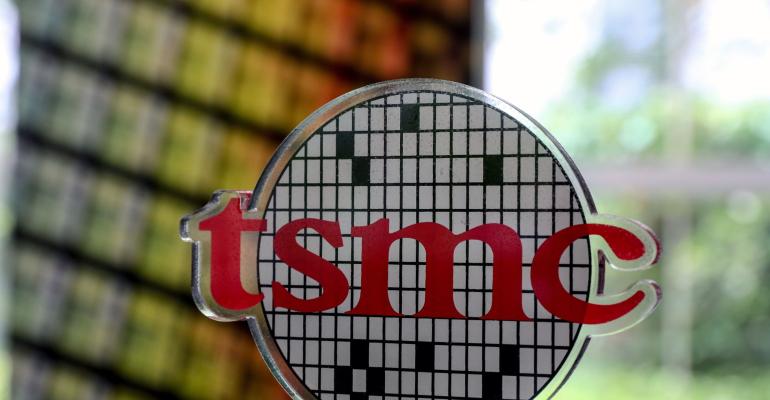(Bloomberg) -- Taiwan Semiconductor Manufacturing cut its annual outlook for revenue and postponed the start of production at its signature Arizona project to 2025, twin setbacks for a chipmaking linchpin struggling with geopolitical tensions and a deep market slump.
TSMC's surprise cut in 2023 revenue projections sent a warning to investors that the global electronics slump may persist for some time despite a boom in AI development. And the delay in the U.S. -- a consequence of a lack of skilled American workers and ballooning costs -- underscores the difficulties in making chips there despite Washington's insistence to reduce a global reliance on Asian facilities.
The main chipmaker for Apple and Nvidia projected a 10% fall in sales this year, vs. previous guidance for a single-digit decline. Executives also warned investors to temper their expectations for a boom in chips for training AI models, saying it was uncertain whether the surge in demand in the wake of ChatGPT was long-term or sustainable. Shares in chip firms including ASML, one of TSMC's primary gear suppliers, slid in Europe.
"The short-term frenzy about AI demand definitely cannot be extrapolated for the long term," Chairman Mark Liu told analysts on a conference call. "Neither can we predict for next year how the sudden demand will continue or flatten out."
TSMC delivered the outlook after posting its first quarterly profit decline in four years, underscoring the extent of a global slide in smartphone and PC demand. It reported a 23% slide in net income to NT$181.8 billion ($5.85 billion). Executives said capital intensity -- a measure of the pace at which TSMC buys or invests in capital equipment -- to slow in coming years.
Executives on Thursday said they were also pushing back the anticipated start of output from its new Arizona plant to 2025. President Joe Biden's administration has made development of domestic chip production a top strategic priority, backed by subsidies in the Chips and Science Act that may top $50 billion. As the U.S. clashes with China, American politicians have been concerned about the vulnerability of Taiwan, which Beijing has claimed as its own territory.
To mitigate concerns from customers over geopolitical uncertainties in the Taiwan Strait, TSMC has been diversifying its manufacturing footprint. It is investing $40 billion to create two fabs in Arizona and constructing a $8.6 billion facility in Japan with financial support from the government. The company remains in discussions with Tokyo over subsidies for a second facility, which might be located alongside its current plant in Kumamoto.
The hiccups in Arizona, however, call into question whether TSMC can make chips abroad as efficiently as back home.
"We are working on improving this by sending skilled technical workers from Taiwan to the U.S.," Liu said.
Investors are still betting on TSMC becoming a heavyweight in the global race to develop next-generation AI.
Top customer Nvidia's chips are essential to ChatGPT, autonomous driving and a new generation of AI products. The U.S. firm's valuation briefly surpassed $1 trillion this year thanks to Wall Street's obsession with generative AI, propping up the fortunes of TSMC and other electronics firms that supply the infrastructure needed to train AI models.
"Although its lower revenue guidance and its Arizona fab push-out were some of the negatives, we think earnings have generally bottomed as the firm looks ready to ramp up 3nm node lines aggressively," said Amir Anvarzadeh at Asymmetric Advisors. "Given that TSMC is the only viable producer of AI chips as well as having the right packaging technology, we see huge upside in both revenues and earnings, especially from next term."
More immediately, the iPhone chipmaker is struggling to sustain margins and growth in its smartphone and consumer-oriented business, which has shrunk alongside a global post-Covid economic downturn.
Signs are mixed as to when that slump might end. TSMC projected sales of $16.7 billion to $17.5 billion this quarter, weaker vs. expectations. Executives said the Chinese post-Covid economic recovery has been slower and soften than anticipated. And the company reaffirmed that 2023 capital expenditure should come in toward the lower end of a previously forecast range of $32 billion to $36 billion.
Samsung this month reported its worst decline in quarterly revenue since at least 2009. Global smartphone shipments plunged 11% in the April to June period, the sixth successive quarterly decline, research firm Canalys estimates.
But backlogs of unsold phones are shrinking. And this week, ASML revealed orders rose in the second quarter after demand for its chip-making machines picked up.
"The smartphone market is sending early signals of recovery," said Le Xuan Chiew, an analyst at Canalys. "Smartphone inventory has begun to clear up as smartphone vendors prioritized cutting inventory of old models to make room for new launches."





